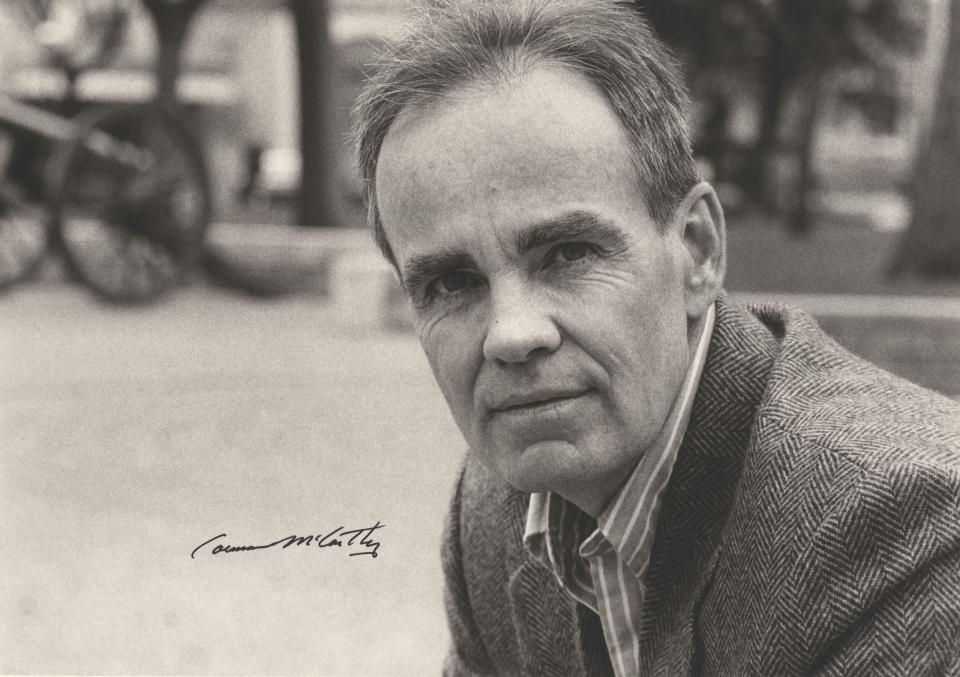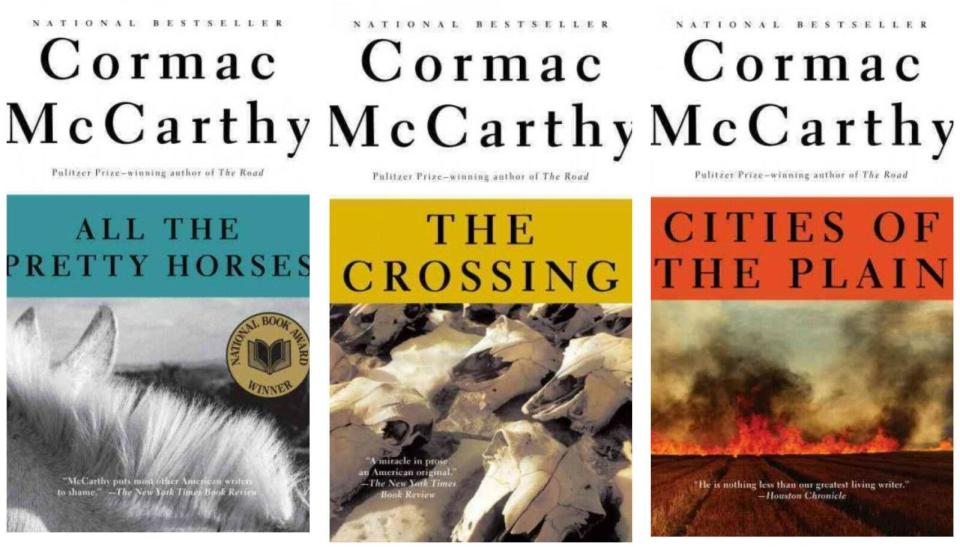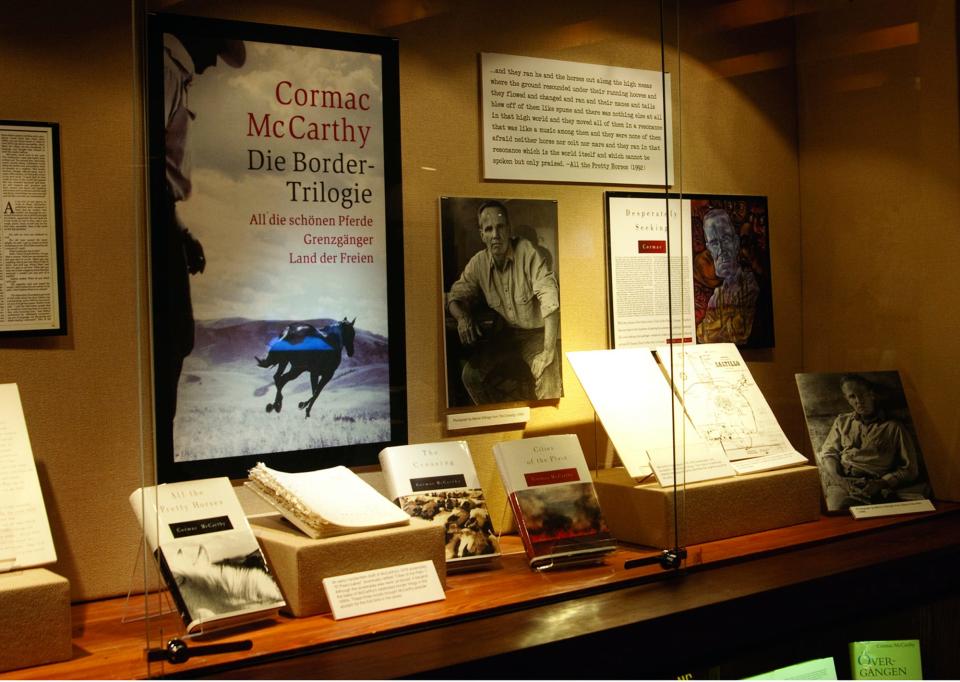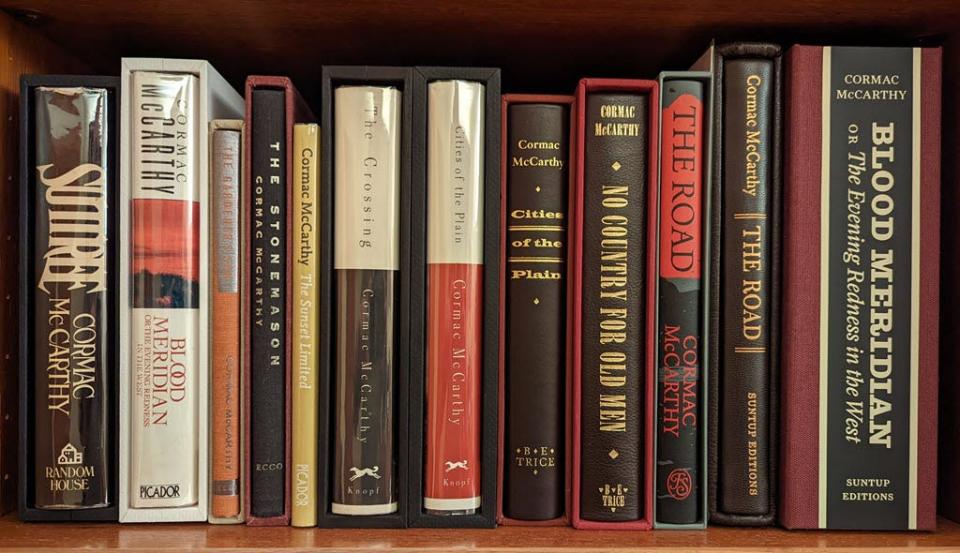'Absolute pinnacle of American letters': Texas writers talk about the late Cormac McCarthy
Don't judge: Cormac McCarthy was never my favorite Texas writer.
Although the author, who died June 13 in Santa Fe, N.M., at age 89, lived in El Paso for years and wrote books set in the U.S.-Mexico Borderlands, it seems inadequate to call him a "Texas writer."
Cormac McCarthy was more than that.
His early Faulknerian novels, set in Tennessee, alerted me to his talents.
The torture and violence, however stylized, in his breakthrough "Blood Meridian," challenged me. For some time, I resisted the "Border Trilogy," which consists of "All the Pretty Horses," "The Crossing" and "Cities on the Plain."
Perhaps I will return to them, especially "All the Pretty Horses," soon.

"The Road" was the first of his novels to shake me to the core. I predicted it would make a terrific movie, but was proven wrong. The apocalypse on the screen did not live up to the apocalypse on the page.
On the other hand, "No Country for Old Men" is as perfect a movie made from a novel as one can imagine. Credit the Coen brothers, who wrote and directed it, as well as McCarthy.
Exclusive: Hear Cormac McCarthy in rare audio acquired by Wittliff Collections
McCarthy attracts legions of admirers. Author Stephen King said McCarthy was "maybe the greatest American novelist of my time." Literary critic Harold Bloom wrote that "Blood Meridian" was "the ultimate Western, not to be surpassed."
It chills me to think that McCarthy died so soon after Bill Wittliff (June 9, 2019) and Larry McMurtry (March 25, 2021), two Texas giants.
What do Texas writers think of McCarthy today? I polled a few. More than one politely declined.
Several said "yes." And boy, did I learn a lot. I am honored to share their collective wisdom today.

From Stephen Harrigan: 'A door to a world you never knew was there'
Stephen Harrigan is often ranked among the top Texas novelists. I recently reread "The Gates of the Alamo." Its story carried me along like the tides of war, and Harrigan's historical footing is as strong as is his storytelling. In this space, I've admired two more recent novels, "The Leopard Is Loose" and "Remember Ben Clayton." Yet one of his finest contributions to Lone Star literature is nonfiction: "Big Wonderful Thing," the best history of Texas for general readers, just as Randolph Campbell's "Gone to Texas" is still the finest academic history.
Stephen Harrigan: I remember reading "Blood Meridian" soon after it came out in 1985 and thinking — well, great literature maybe, but not for me. Its violence struck me as too mannered and eccentric, its nihilism too in-your-face.
But when I read "All The Pretty Horses" in 1992, I was exhilarated in the way you can only be when an artist opens a door to a world you never knew was there.
It’s hard to remember how new that novel felt, especially now when I can gauge so clearly how Cormac McCarthy was channeling other voices — Hemingway, Faulkner, the King James Bible, Louis L’Amour — that were not his own. But the amalgam he created from all those influences somehow legitimately belonged to him, and it was intoxicating.
There was a mysterious authority in every sentence. The lack of quotation marks — which always irritates me in other novels — somehow supported the exactitude of the dialogue. The descriptions of landscape and weather were not descriptions — they were just what you experienced as the words on the page seemed to disappear.
San Angelo's Cactus Book Shop: Top seller of Texana and Western Americana books
Looking back, I think I was fortunate to come across McCarthy’s work at an age when my own writing voice had already mostly developed. He’s one of those novelists that young writers can’t help imitating, just as children can’t help developing an accent from the place they grow up.
Even now, I’m always on the lookout for trace elements of McCarthy’s style in my own writing — a sentence that really should have a comma, a descriptive passage that threatens to veer into the baroque. Cormac McCarthy-isms have a way of creeping into my prose like auto-corrects, and I have to be vigilant, because I know there’s only one guy who can ever get away with writing like that.

From Sarah Bird: 'All the Pretty Horses' and carsickness
Sarah Bird was the first Texas writer to made me fall in love with Austin, not as imagined, but as lived. Her comic campus romp, "Alamo House," danced around the same key blocks of Austin as did Richard Linklater's "Slacker." Bird's publishing career since then has been wide and deep. Among her recent historical novels, "Last Dance on the Starlight Pier" and "Daughter of a Daughter of a Queen," are set partly in Texas. You might recall delighted responses to "Last Dance" and "Daughter" in these pages.
Sarah Bird: “All the Pretty Horses” and carsickness will always be linked in my mind.
It was 1993 and I was helping to judge the Texas Institute of Letter’s Award for Best Fiction. As a champion of overlooked and fledgling writers — and no great fan of the hyper masculine or ultra-violent — I was annoyed that literary giant Cormac McCarthy’s blockbuster had been entered.
I put off reading it until the last minute. That minute arrived as my husband and I were driving home from a South Padre Island beach break. The judges’ meeting was scheduled for early the next day so I had no choice but to read the remaining entry in the car. An activity guaranteed to incite digestive distress.
Best TV shows about Texas. From 'Lonesome Dove' to 'Friday Night Lights' and 'Mo'
Guess what turned out to be stronger than reverse peristalsis? McCarthy’s booming narrative voice.
Generally regarded as his most accessible novel, I devoured “All the Pretty Horses” and became a Cormac convert. There was not the tiniest question that it was, far and away, the finest among the many fine entries and I made just that argument at the meeting.
Several of my fellow judges had the same concerns that I’d initially fostered. They argued that the award was intended to encourage unknown and unheard writers. I kept agreeing then asking, “But the award is for the ‘best’ fiction. Which is the best book?”
In the end, the vote was unanimous.
When I announced the winner at the institute's annual meeting which, unsurprisingly, Cormac did not attend, I tried to console all the other exceptional entrants by quoting Flannery O’Connor on the topic of William Faulkner, “Nobody wants his mule and wagon stalled on the same track the Dixie Limited is roaring down.”

From Steven L. Davis: 'He was completely human'
Winner of national nonfiction awards, Davis has written or edited eight books. He has served as longtime literary curator at the Wittliff Collections at Texas State University, which under his guidance, landed the Cormac McCarthy papers. Those archives in San Marcos include "100 boxes of notes, correspondence, hand-written and typed drafts, setting copies, proofs and other materials documenting the author’s career." Among Davis' books previously discussed in this column include "Texas Literary Outlaws," "J. Frank Dobie: A Liberated Mind" and "Viva Texas Rivers!" (A road trip buddy and I contributed a short chapter to that book.)
Steven L. Davis: Reading McCarthy’s novels can make you feel as though a divine force is delivering a thundering scripture. But when you go behind the scenes and look at his archive, you can see the human effort and struggle that went into creating the art.
McCarthy’s work ethic was incredible — he would spend decades on a book before deciding it was finished. His literary papers also reveal his long-time infatuation with movies.
McCarthy was considered a recluse, but when it came to movies based on his books he would show up at the premieres and pose with the actors. And he was there at the Academy Awards when "No Country for Old Men" won Best Picture, standing up and leading the cheers. While McCarthy could write like an avenging angel, he was also completely human.
From James Wade: 'The absolute pinnacle of American letters'
James Wade is the author of "Beasts of the Earth," winner of the 2023 Spur Award for Best Contemporary Novel, "River, Sing Out" and the well-received debut novel "All Things Left Wild," winner of the MPIBA Reading the West Award for Debut Fiction, and a recipient of the Spur Award for Best Historical Novel from the Western Writers of America. He lives in the Hill Country with his wife and daughter.
James Wade: When I began trying to write fiction, I was reading everything I could get my hands on. I studied varying styles, Faulkner’s long sentences versus Hemingway’s short, spare ones. Raymond Carver’s simple dialogue versus Flannery O’Connor and William Gay’s loud, colorful characters.
But then came Cormac McCarthy, and nothing would ever be the same.
The way he manipulated language, created tone and plumbed the depth and depravity of human nature, all while breaking almost every editorial rule. It was far and away the most beautiful art I’d ever encountered.
Texas outdoors: Six summer books to transport the reader
Transformative.
I knew, immediately, I’d never reach such literary mastery; and I also knew I’d never be able to stop reaching for it.
His portrayal of the world was unflinching, but not without hope. Yes, his novels are full of violence and dark scenarios, but amid such bleakness, his characters push forward, reminding us that even in the worst possible circumstances there can still exist some manner of grace, of charity and certainly of love.
For writers of Westerns and Southern Gothic novels, McCarthy gave us permission to experiment with prose, to incorporate metaphysics and philosophy into our stories, and to always put our craft first — above publicity, notoriety or anything else that might distract from the pursuit of a great novel.
In my opinion, he is unrivaled — the absolute pinnacle of American letters.
Michael Barnes writes about the people, places, culture and history of Austin and Texas. He can be reached at mbarnes@gannett.com. Sign up for the free weekly digital newsletter, Think, Texas, at statesman.com newsletters or the newsletter page of your local USA Today Network paper.
This article originally appeared on Austin American-Statesman: Cormac McCarthy became a legend among Texas writers and inspired them

